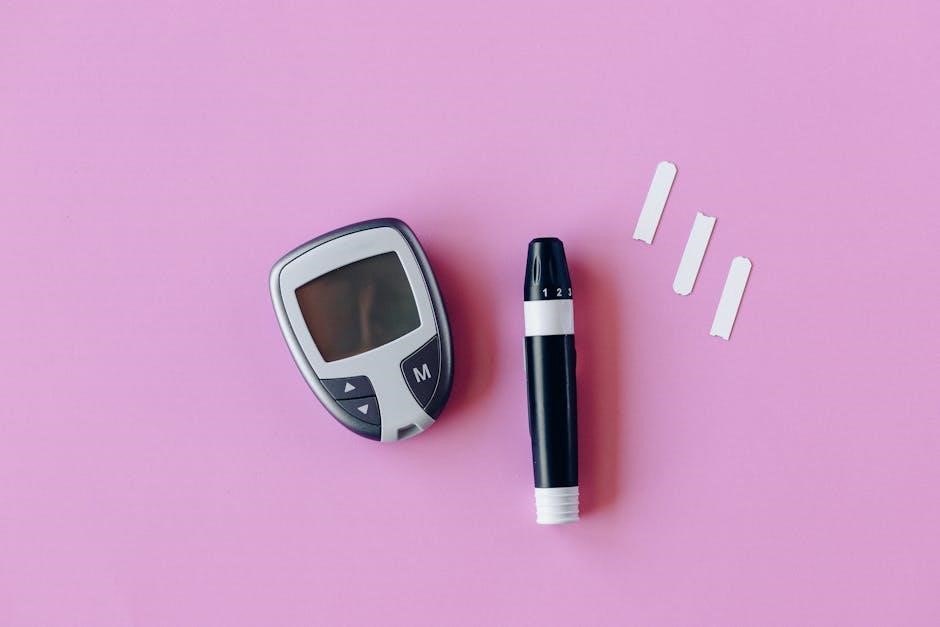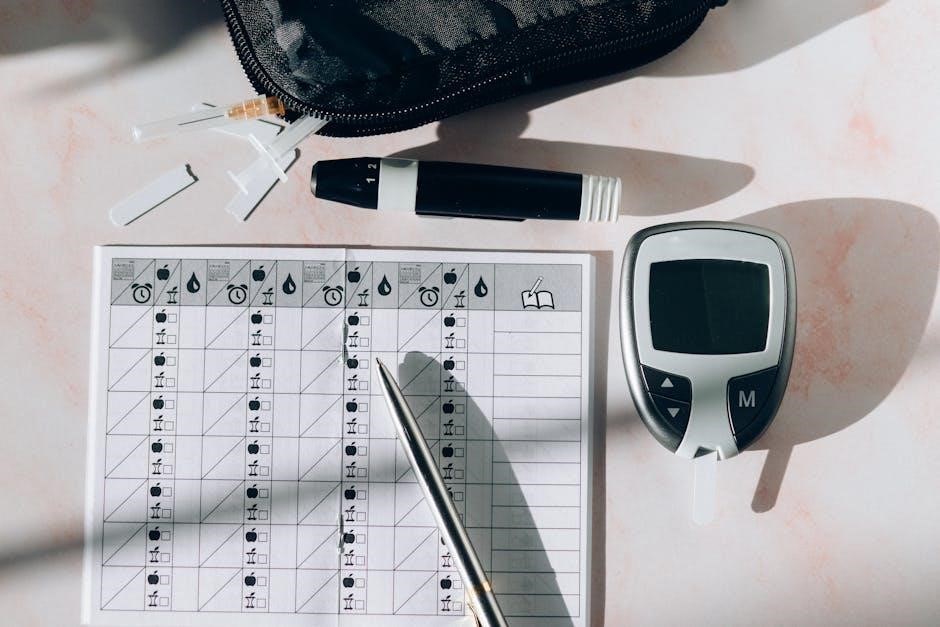The Blood Type B Negative Diet, based on Dr. Peter D’Adamo’s research, emphasizes foods like lamb, venison, and green vegetables to balance nutrients and minimize harmful reactions.

Overview of the Blood Type Diet Concept
The Blood Type Diet, introduced by Dr. Peter D’Adamo, suggests that individuals with specific blood types should consume foods aligned with their biology for optimal health. Blood Type B individuals, including B Negative, are believed to thrive on a mixed diet rich in proteins, vegetables, and select grains. This approach aims to enhance digestion, reduce inflammation, and promote overall well-being by categorizing foods as “beneficial,” “neutral,” or “harmful” based on blood type. The diet emphasizes balancing nutrients to support immune function and energy levels.
Importance of Adapting the Diet to Blood Type B Negative
Adapting the diet to Blood Type B Negative is crucial for maintaining health and preventing chronic conditions. This blood type tends to have higher risks of autoimmune diseases and weight gain. By focusing on beneficial foods like lean meats, low-fat dairy, and green vegetables, individuals can improve digestion and reduce inflammation. Avoiding harmful foods such as corn, wheat, and processed meats helps maintain immune balance and overall well-being; Tailoring the diet to B Negative specific needs supports long-term health and vitality.

Beneficial Foods for Blood Type B Negative
Lamb, mutton, venison, and certain fish like cod are highly beneficial. Low-fat dairy, eggs, and green vegetables like spinach and asparagus are also ideal choices.
Meats and Poultry
For Blood Type B Negative, beneficial meats include lamb, mutton, and venison, which promote optimal health and digestion. Rabbit and lean cuts of beef are also recommended. Poultry like turkey and chicken should be consumed in moderation, while duck and goose are best avoided. Eggs are highly beneficial, providing essential protein and nutrients. These foods align with the blood type’s unique metabolic needs, supporting energy and immune function. Avoid processed meats like bacon and ham to maintain a balanced diet. Dr. Peter D’Adamo’s recommendations emphasize natural, unprocessed options for optimal health benefits.
Seafood
For Blood Type B Negative individuals, cod, flounder, and silver perch are highly beneficial seafood options, promoting health and digestion. Caviar is also recommended. However, shrimp, crab, lobster, and mussels should be avoided, as they can trigger harmful reactions. These choices align with the diet’s principles, optimizing nutrient absorption and minimizing adverse effects. By focusing on the right seafood, individuals can maintain a balanced and nutritious diet tailored to their blood type, ensuring overall well-being and energy levels. Always refer to a detailed food list for specific guidance.
Dairy and Eggs
Dairy products are highly beneficial for Blood Type B Negative individuals, with cottage cheese, feta, goat cheese, and yogurt being ideal choices. Eggs are also highly recommended, providing essential proteins and nutrients. These foods support immune function and overall health. Incorporating low-fat dairy and eggs into the diet helps maintain energy levels and reduces the risk of autoimmune issues. This category is particularly advantageous for Blood Type B Negative individuals, as they can tolerate dairy products better than other blood types, making them a staple in their dietary plan.
Grains and Vegetables
For Blood Type B Negative individuals, certain grains and vegetables are highly beneficial. Oats, quinoa, brown rice, and buckwheat are excellent choices, providing sustained energy and fiber. Leafy greens like spinach, kale, and arugula are also advantageous, supporting immune function and digestion. Vegetables such as cucumbers, celery, and radishes are recommended for their alkalizing properties. Avoid corn, wheat, and some nightshades, as they may trigger inflammation. Incorporating these grains and vegetables helps maintain a balanced and nutritious diet tailored to Blood Type B Negative needs, promoting overall well-being and vitality.

Foods to Avoid for Blood Type B Negative
Certain foods can cause adverse reactions in Blood Type B Negative individuals. Avoid chicken, corn, and wheat, as they may trigger inflammation and digestive issues. Limit intake of processed foods high in unhealthy fats and sodium to maintain optimal health and prevent potential autoimmune responses. These restrictions help tailor the diet to specific physiological needs, ensuring a more balanced and beneficial eating plan.
Meats and Poultry to Avoid
For Blood Type B Negative individuals, certain meats and poultry should be avoided to prevent negative reactions. Avoid chicken, duck, and pork, as they can cause inflammation. Processed meats like bacon, ham, and sausage are also harmful due to high sodium and preservatives. These foods may trigger immune responses or digestive issues. Limiting or eliminating them helps maintain a balanced diet tailored to your blood type, promoting overall health and reducing the risk of chronic conditions associated with poor dietary choices.
Seafood to Avoid
Individuals with Blood Type B Negative should avoid certain seafood to maintain optimal health. Shellfish like shrimp, crab, and lobster can trigger adverse reactions. Additionally, fish such as tilapia and swordfish should be limited due to their potential inflammatory effects. High-mercury fish, such as shark and mackerel, are also harmful. While some seafood is beneficial, others can disrupt digestion and immune function. Avoiding these specific seafood options helps align your diet with your blood type, fostering better overall well-being and reducing the risk of health complications.
Grains, Vegetables, and Fats to Avoid
For Blood Type B Negative individuals, certain grains, vegetables, and fats should be avoided to prevent adverse reactions. Grains like corn, wheat, and barley can cause inflammation and digestive issues. Vegetables such as tomatoes, olives, and eggplant should be limited due to their potential to trigger immune responses. Additionally, fats like safflower oil and sunflower oil are harmful and should be avoided. These foods can disrupt metabolism and increase the risk of chronic health conditions, making it crucial to eliminate them from your diet to maintain overall well-being.

Practical Tips for Implementing the Blood Type B Negative Diet
Plan meals with beneficial foods like lamb and green vegetables, avoid harmful grains and fats, and create a shopping list to ensure dietary adherence.
Creating a Weekly Meal Plan
A weekly meal plan for Blood Type B Negative should focus on beneficial foods like lamb, venison, and green vegetables. Start with breakfast options such as eggs, oatmeal, or smoothies with spinach and berries; For lunch, include lean meats like turkey or chicken breast, paired with quinoa or brown rice. Dinners can feature fish like cod or salmon, alongside steamed vegetables like broccoli or asparagus. Snacks such as almonds or cucumber slices are ideal. Rotate proteins and vegetables to maintain variety and ensure nutritional balance. Consult a PDF guide for detailed meal ideas and portion sizes to stay on track.
Shopping List Essentials
Your shopping list should include lean meats like lamb, venison, and turkey, along with green vegetables such as spinach, broccoli, and asparagus. Incorporate whole grains like oats, quinoa, and brown rice, and low-fat dairy products such as cottage cheese and yogurt. Fresh eggs, nuts like almonds, and seeds are also beneficial. Avoid corn, wheat, and most seafood. Refer to a Blood Type B Negative PDF guide for a detailed list of foods to prioritize and avoid, ensuring a balanced and tailored diet.

Scientific Perspective and Controversies
The Blood Type Diet lacks rigorous scientific support, with critics arguing it’s a fad diet. Many experts question its claims about blood type influencing digestion and health outcomes.
Criticism of the Blood Type Diet
The Blood Type Diet has faced criticism for lacking robust scientific evidence. Many experts consider it a fad diet, questioning its claims about blood type influencing digestion and health outcomes. Studies suggest that individual responses to diets vary widely and are not solely determined by blood type. Critics also argue that the diet’s restrictions can lead to nutrient deficiencies and that its benefits are not universally applicable. Additionally, the diet’s reliance on blood type as the primary factor overlooks other important aspects of nutrition and health.
Studies Supporting the Diet
Some studies suggest the Blood Type Diet may offer benefits, particularly for blood type B individuals. Research indicates that adhering to the diet can improve digestion, reduce inflammation, and support weight management. A study published in the Journal of Alternative and Complementary Medicine found that participants following the diet reported better overall health and fewer digestive issues. Additionally, specific foods recommended for type B, such as lamb and green vegetables, are rich in nutrients that align with the diet’s principles, potentially contributing to its positive outcomes for some individuals.

Resources for Blood Type B Negative Diet
Downloadable PDF guides, Dr. Peter D’Adamo’s book “Eat Right for Your Blood Type,” and recommended websites provide detailed food lists and meal plans for blood type B individuals.
PDF Guides and Food Lists
PDF guides for the Blood Type B Negative Diet provide comprehensive food lists, categorizing foods as beneficial, neutral, or harmful. These guides, often based on Dr. Peter D’Adamo’s research, detail portion sizes and meal planning tips. They include charts for meats, seafood, dairy, grains, and vegetables, ensuring clarity and ease of use. Many PDFs are free to download and offer practical advice for grocery shopping and preparing balanced meals tailored to Blood Type B Negative individuals. They are invaluable resources for adhering to the diet effectively.
Recommended Reading and Websites
For a deeper understanding of the Blood Type B Negative Diet, Dr. Peter D’Adamo’s book, Eat Right for Your Blood Type, is a foundational resource. Websites like D’Adamo’s official site offer detailed food lists, meal plans, and scientific insights. Additionally, PDF guides provide convenient access to categorized food charts, portion sizes, and practical tips. These resources help individuals with Blood Type B Negative maintain a balanced diet and optimize their health outcomes by adhering to tailored nutritional recommendations.
